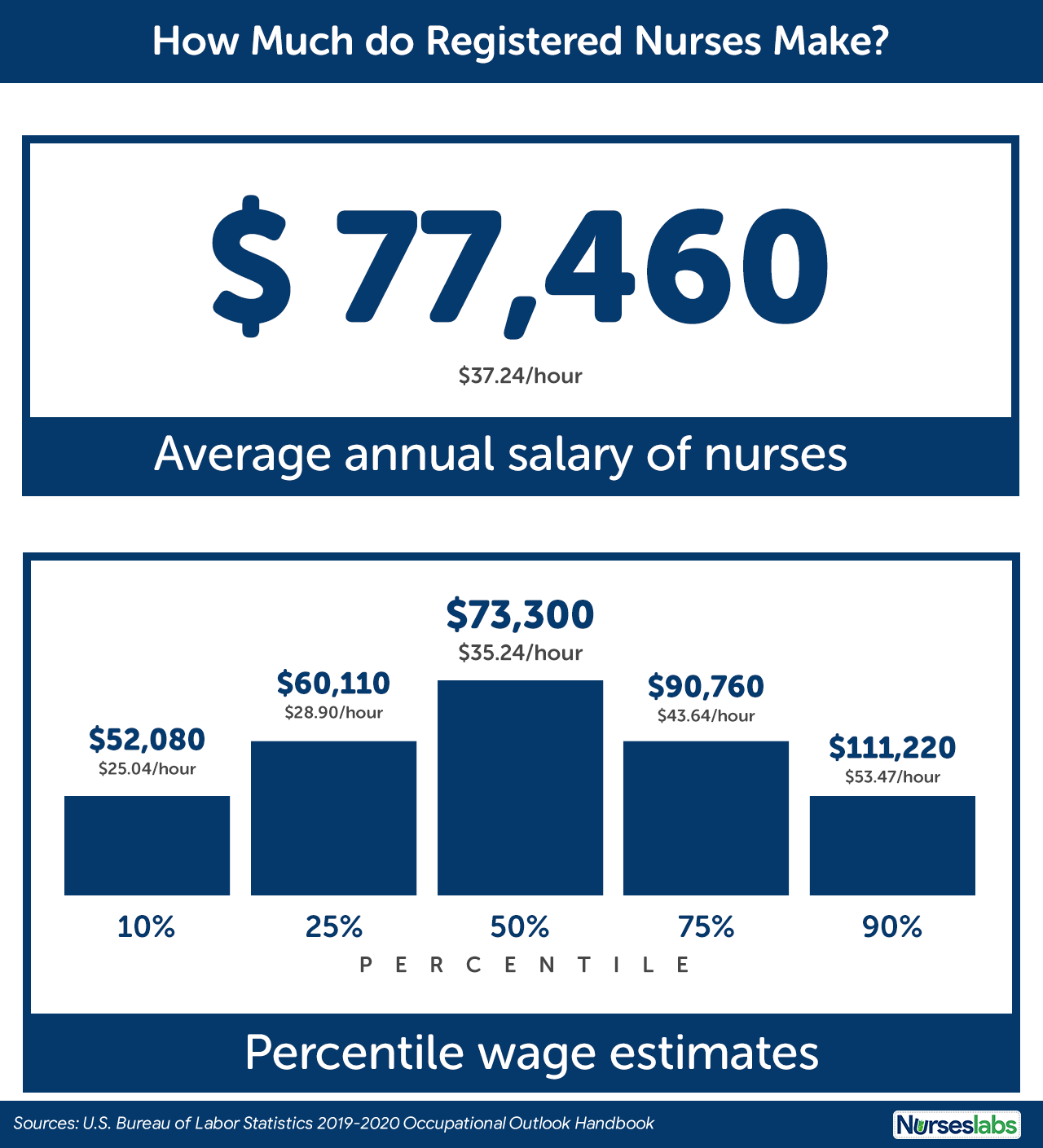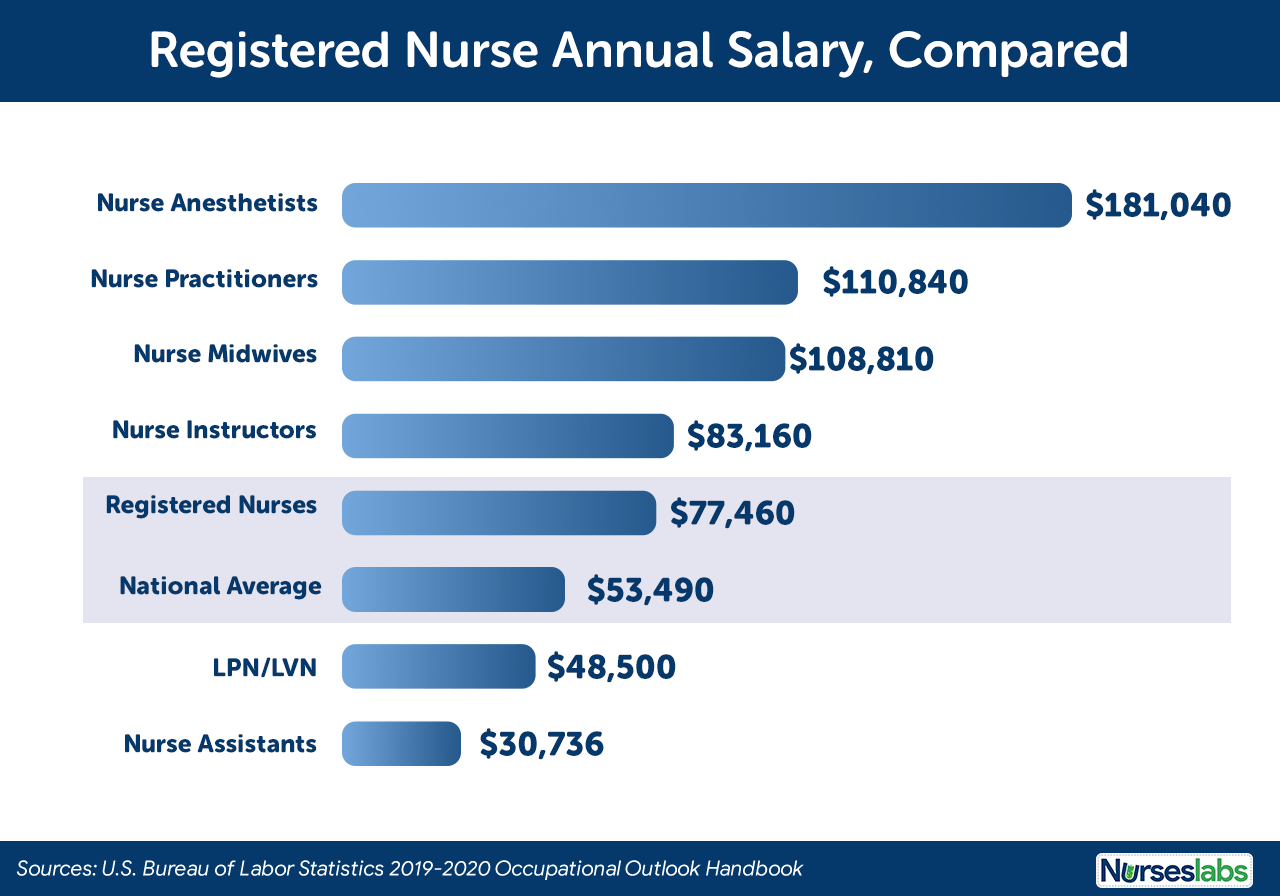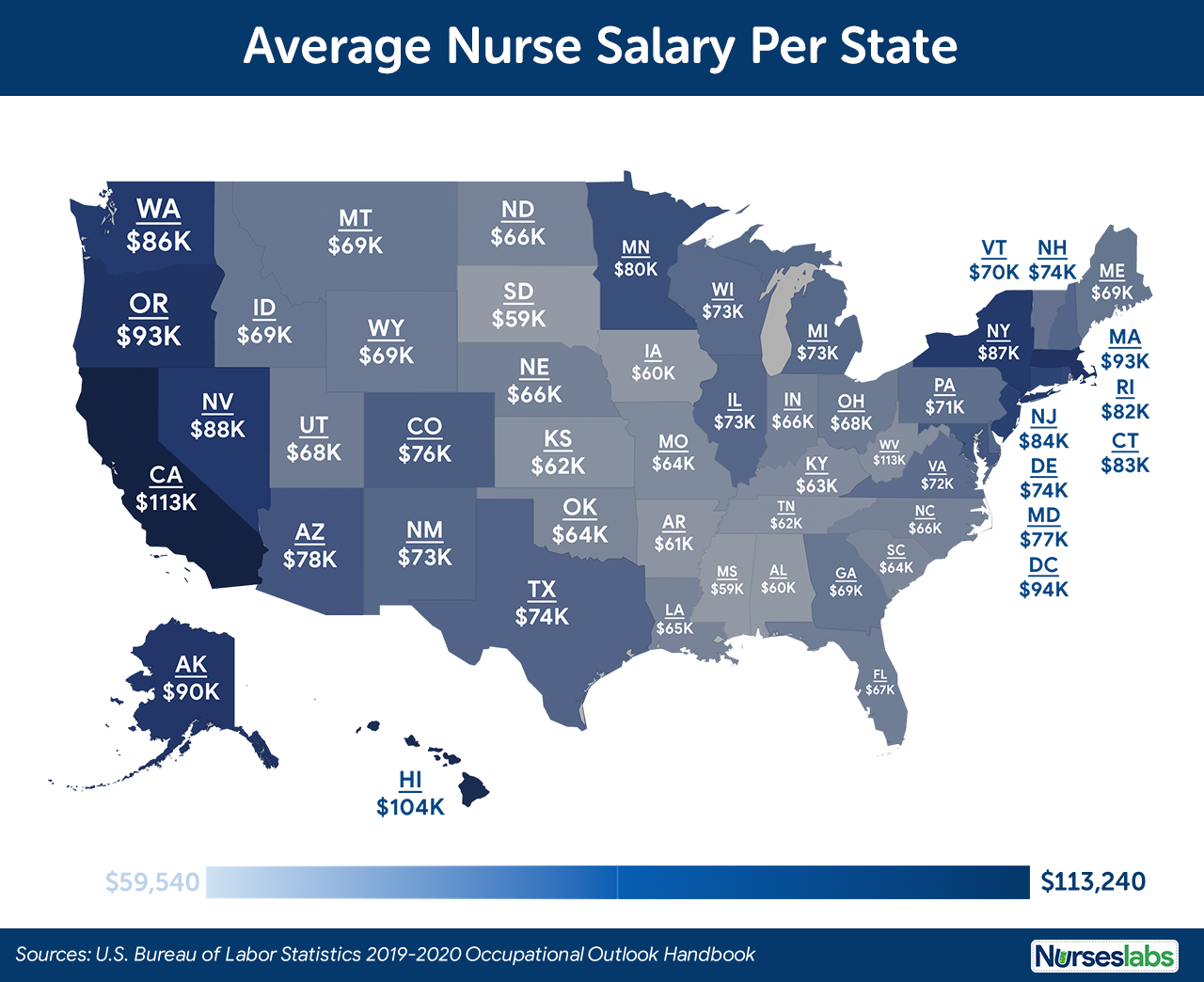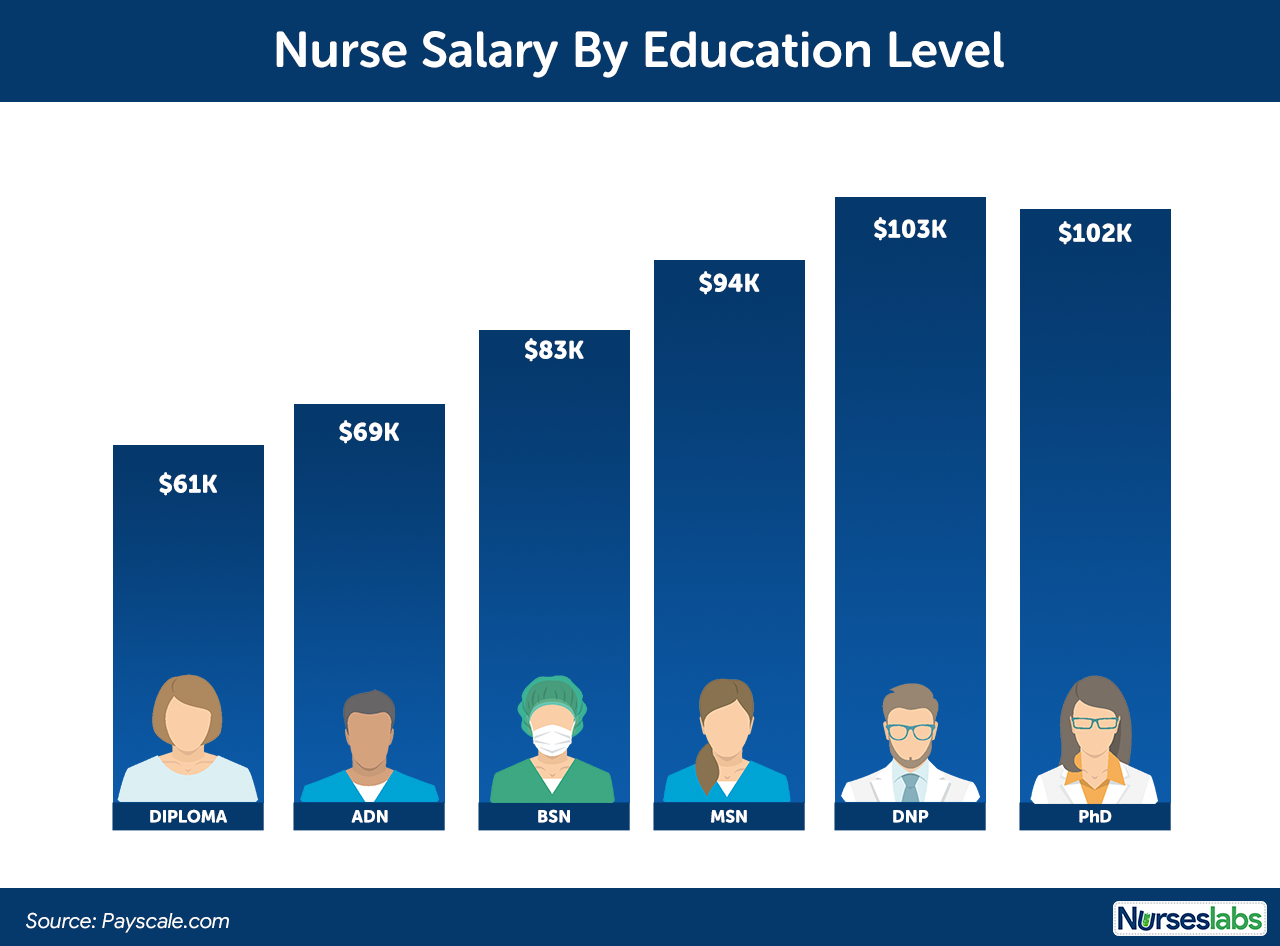NOTE: This is an outdated article and should be used only if you want to see the data from 2019-2020. Visit Nurse Salary: How Much Do Registered Nurses Make? for the updated article.
Salaries of registered nurses in the US are among the best in the world. But how much do nurses make? Here you’ll find the answer to this question including many insights about nurse salaries. We take a look at the average nurse salary and also registered nurse salaries by state. We then highlight a number of other factors that influence the salary you can expect to earn. Or that can affect your decision about where to study and where to apply for a job.
This nurse salary guide for 2020 will give you an outlook on what the data says about nurse salaries and how you can negotiate for better pay to grow your career in nursing.
Table of Contents
- What is the Average Nurse Salary?
- Salary Growth of Registered Nurses
- Nurse Salary Compared
- Nurse Salaries by State
- Salaries by Employer
- Salary by Educational Level and Academic Preparation
- Experience
- Male vs Female: Gender Pay Gap in Nursing
- Nursing: Still a Great Career Choice in the US
What is the Average Nurse Salary?
The national average salary of a registered nurse as of 2020 is at $77,460 per year, representing an hourly wage of $37.24. The data is according to the estimates released by the United States Bureau of Labor Statistics (BLS) Occupational Outlook Handbook in March 2020. There was an increase in the average hourly wage of nearly one dollar between 2018 and 2019 The average annual salary of the 10% of RN’s who earned the least was $52,080, and the top 10% earned an average of $111,220.
Salary Growth of Registered Nurses
At an average, the salary of registered nurses grew by 1.51% per year in the decade 2010 to 2019 according to data by the BLS. Salaries are expected to grow further as the demand for nurses increases.
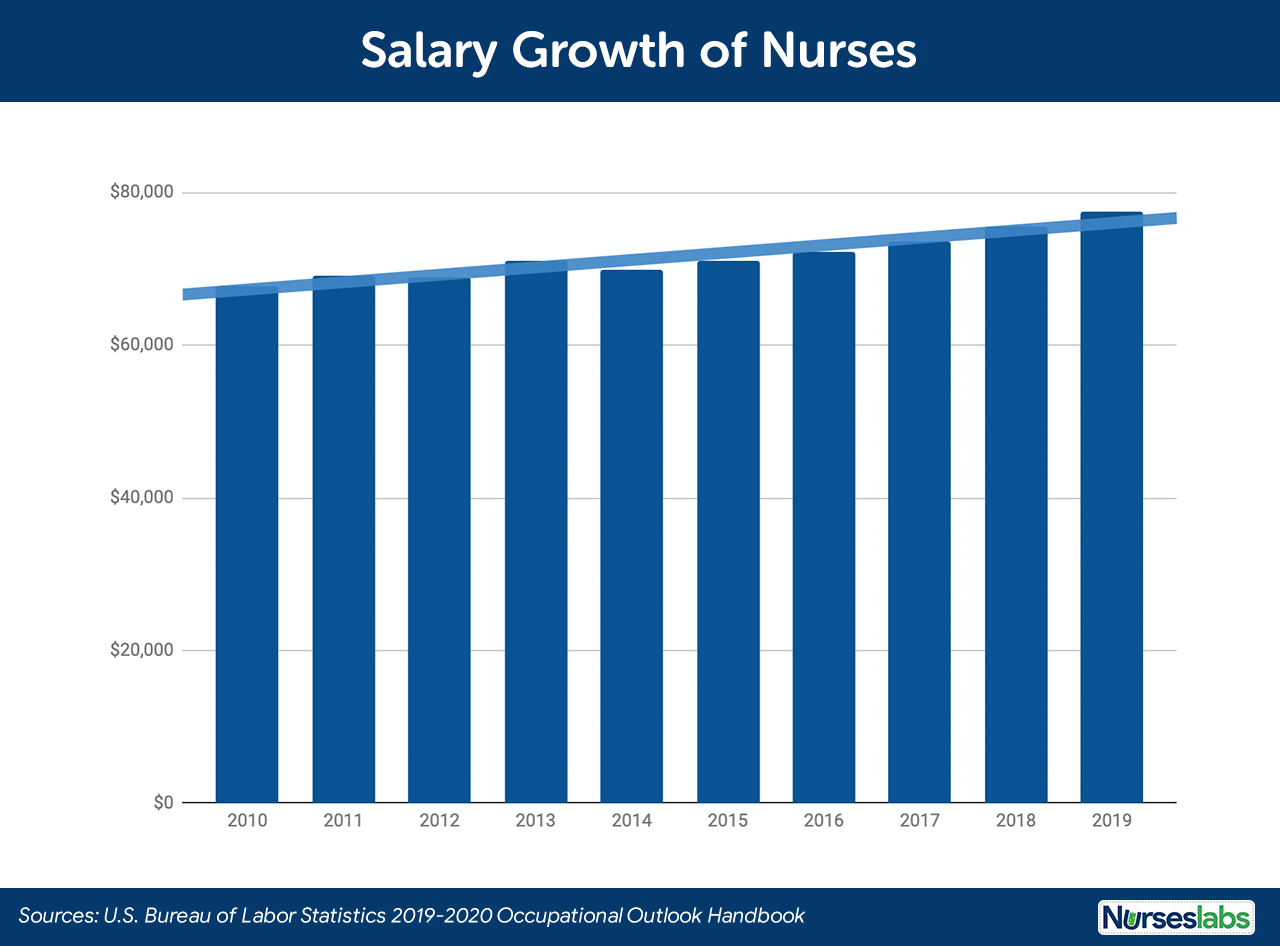
Factors that are expected to drive growth include higher demand for preventive care, retirement of the baby boomer generation, access to be better medical technology, and expanded health coverage for more Americans.
| YEAR | PER HOUR | SALARY | GROWTH | %GROWTH |
|---|---|---|---|---|
| 2007 | $30.04 | $62,483 | – | |
| 2008 | $31.31 | $65,125 | $2,642 | 4.06% |
| 2009 | $31.99 | $66,539 | $1,414 | 2.13% |
| 2010 | $32.56 | $67,725 | $1,186 | 1.75% |
| 2011 | $33.23 | $69,118 | $1,394 | 2.02% |
| 2012 | $33.13 | $68,910 | -$208 | -0.30% |
| 2013 | $34.20 | $71,136 | $2,226 | 3.13% |
| 2014 | $33.55 | $69,784 | -$1,352 | -1.94% |
| 2015 | $34.14 | $71,011 | $1,227 | 1.73% |
| 2016 | $34.70 | $72,176 | $1,165 | 1.61% |
| 2017 | $35.36 | $73,549 | $1,373 | 1.87% |
| 2018 | $36.30 | $75,504 | $1,955 | 2.59% |
| 2019 | $37.24 | $77,460 | $1,956 | 2.53% |
| 2020 | $38.47 | $80,010 | $2,550 | 3.19% |
| AVE TOTAL | $34.02 | $70,752 | $1,225 | 1.65% |
Nurse Salary Compared
The average salaries earned by registered nurses compare very well with the overall US national salary average of $53,490 per year or $25.72 per hour. However, registered nurses earn slightly less than the average for everyone in the health sector which was estimated at $83,640 per year, with an hourly average of $40.21.
In comparison, licensed practical or vocational nurses (LPN/LVN) earned an average of $48,500 per year or $23.32 per hour. Meanwhile, nursing assistants‘ average salary is at $30,720 per year.
Nurse practitioners (NP) (excluding nurse anesthetists) earn on average $110,840 per year or $53.77 per hour. NPs are RNs with specialized education that diagnose and treat acute, episodic, or chronic illness, independently or as part of a healthcare team. The top 10% of nurse practitioners earn $152,160.
Nurse instructors, who demonstrate and teach nursing science in classrooms and clinical units to nursing students, earn an average salary of $83,160 per year.
The figures for nurse-midwife salaries were only available for about two-thirds of the states so the number included in the estimates was relatively low. Average annual salaries of nurse-midwives are at $108,810, or $52.31 per hour. This puts their earnings slightly lower than that of the other advanced practice registered nurses.
Certified Registered Nurse Anesthetists (CRNA) remain the highest paid nurses at an average annual salary of $181,040, or $87.04 per hour. CRNAs earn in a range of $127,480 (lowest 10%) to $208,000 (top 10%). If you are interested in becoming a CRNA, please read our guide Certified Registered Nurse Anesthetist: How To Become a CRNA.
Nurse Salaries by State
What are the best paying states for nurses? According to the BLS data, the top five highest paying states for registered nurses are: California, Hawaii, District of Columbia, Massachusetts, and Oregon.
The table below provides details on the total number of employed registered nurses in each state, their average annual nurse salaries, and the average hourly wage. Not all nurses earn the same. As you can see in the table, the state in which a nurse works has a big influence on the salary they’ll earn. When considering your potential salary, it’s also very important to keep in mind the cost of living in a particular state – in other words, the actual buying power of each dollar you earn. To allow for easy comparison, we have provided the (RPP) for each state. This figure is a percentage of the cost of living in each state compared to national price levels. In terms of the RPP, you can do the same with a salary of $55,000 in Maryland (RPP 10% higher) as with a salary of $45,000 Kansas (10% lower).
| STATE | #RNS | ANNUAL | PER HOUR | RPP |
|---|---|---|---|---|
| Alabama | 49,190 | $60,230 | $28.96 | 86.7 |
| Alaska | 6,210 | $90,500 | $43.51 | 104.4 |
| Arizona | 54,590 | $78,330 | $37.66 | 96.4 |
| Arkansas | 25,210 | $61,330 | $29.49 | 86.5 |
| California | 302,770 | $113,240 | $54.44 | 114.8 |
| Colorado | 52,510 | $76,230 | $36.65 | 103.2 |
| Connecticut | 34,740 | $83,440 | $40.12 | 108.0 |
| Delaware | 11,730 | $74,100 | $35.63 | 100.1 |
| District of Columbia | 10,890 | $94,820 | $45.59 | 116.9 |
| Florida | 181,670 | $67,610 | $32.50 | 99.9 |
| Georgia | 75,430 | $69,590 | $33.46 | 92.5 |
| Hawaii | 11,330 | $104,060 | $50.03 | 118.0 |
| Idaho | 14,110 | $69,480 | $33.40 | 93.0 |
| Illinois | 129,530 | $73,510 | $35.34 | 98.5 |
| Indiana | 67,510 | $66,560 | $32.00 | 89.8 |
| Iowa | 32,980 | $60,590 | $29.13 | 89.8 |
| Kansas | 30,370 | $62,450 | $30.02 | 90.0 |
| Kentucky | 43,840 | $63,750 | $30.65 | 87.9 |
| Louisiana | 40,870 | $65,850 | $31.66 | 90.1 |
| Maine | 14,490 | $69,760 | $33.54 | 98.4 |
| Maryland | 53,150 | $77,910 | $37.46 | 109.4 |
| Massachusetts | 81,020 | $93,160 | $44.79 | 107.9 |
| Michigan | 96,900 | $73,200 | $35.19 | 93.0 |
| Minnesota | 71,000 | $80,130 | $38.52 | 97.5 |
| Mississippi | 29,550 | $59,750 | $28.73 | 85.7 |
| Missouri | 68,840 | $64,160 | $30.85 | 89.5 |
| Montana | 10,310 | $69,340 | $33.34 | 94.6 |
| Nebraska | 23,800 | $66,640 | $32.04 | 89.6 |
| Nevada | 22,940 | $88,380 | $$42.49 | 97.6 |
| New Hampshire | 14,320 | $73,880 | $35.52 | 105.8 |
| New Jersey | 80,140 | $84,280 | $40.52 | 112.9 |
| New Mexico | 17,350 | $73,300 | $35.24 | 93.3 |
| New York | 178,320 | $87,840 | $42.23 | 115.8 |
| North Carolina | 99,960 | $66,440 | $31.94 | 91.3 |
| North Dakota | 9,750 | $66,290 | $31.87 | 90.1 |
| Ohio | 125,470 | $68,220 | $32.80 | 88.9 |
| Oklahoma | 31,350 | $64,800 | $31.15 | 89.0 |
| Oregon | 36,660 | $92,960 | $44.69 | 99.5 |
| Pennsylvania | 148,040 | $71,410 | $34.33 | 97.9 |
| Rhode Island | 12,630 | $82,310 | $39.57 | 98.6 |
| South Carolina | 46,860 | $64,840 | $31.17 | 90.4 |
| South Dakota | 12,950 | $59,540 | $28.63 | 88.2 |
| Tennessee | 63,330 | $62,570 | $30.08 | 90.4 |
| Texas | 218,090 | $74,540 | $35.84 | 97.0 |
| Utah | 21,650 | $67,970 | $32.68 | 97.0 |
| Vermont | 7,020 | $70,240 | $33.77 | 102.5 |
| Virginia | 66,040 | $71,870 | $34.56 | 102.1 |
| Washington | 58,000 | $86,170 | $41.43 | 106.4 |
| West Virginia | 19,830 | $63,220 | $30.39 | 87.0 |
| Wisconsin | 61,930 | $72,610 | $34.91 | 92.4 |
| Wyoming | 5,120 | $68,690 | $33.03 | 95.2 |
Salaries also differ considerably between metropolitan and rural areas – the cost of living and nurses’ salaries are generally much higher in the cities. This is mainly because housing costs a lot more. The large populations in cities create a greater demand for housing and this drives prices up.
Salaries by Employer
Registered nurse salaries differ quite a bit depending on where and by whom they are employed. Of the 2,982,280 registered nurses included in the BLS survey, the single largest group employed in general medical and surgical hospitals (31%) with an average salary of $79,460. Registered nurses employed in outpatient care centers earn the most at an average of $84,720. Nurses working in offices of physicians, home health care services, and school nurses have slightly below-average salaries. Nurses in school health services earn an average of $67,870.
| INDUSTRY | #EMPLOYED | % | HOURLY | ANNUAL |
|---|---|---|---|---|
| General Medical and Surgical Hospitals | 1,713,120 | 30.6 | $38.20 | $79,460 |
| Offices of Physicians | 197,890 | 7.47 | $33.45 | $69,570 |
| Home Health Care Services | 177,790 | 11.86 | $35.41 | $73,660 |
| Outpatient Care Centers | 147,550 | 15.47 | $40.73 | $84,720 |
| Federal Executive Branch (OES Designation) | 83,330 | 3.16 | $43.42 | $90,310 |
| Direct health and medical insurance carriers | 24,230 | 6.16% | $37.21 | $77,390 |
| Health and personal care stores | 1690 | 0.16 | $36.51 | $75,930 |
| Computer systems design and related services | 940 | 0.04 | $35.26 | $73,340 |
| Business support services | 650 | 0.07 | $44.33 | $92,200 |
| Legal Services | 290 | 0.03 | $34.80 | $77,820 |
| Pharmaceutical and Medicine Manufacturing | 260 | 0.09 | $41.54 | $86,400 |
| Nursing Care Facilities (Skilled Nursing Facilities) | 151.3 | 9.43 | $33.53 | $69,740 |
Certain industries pay considerably more than the average. Registered nurses who work for the federal government, as opposed to state or local governments, earn an average nurse salary of $90,340. Those working in business support services are very well paid at an average of $92,200.
Salary by Educational Level and Academic Preparation
The type of education with which you qualify as a registered nurse is also a factor in the salary you’ll learn. With a Diploma in Nursing you’ll earn an average of $61,000 while with an Associate Degree in Nursing (ADN) you can expect $69,000 average. There is a significant salary jump between an ADN and a Bachelor of Science in Nursing (BSN). With the latter you can earn an average of $83,000 according to Payscale.com.
Nurses with a Master of Science in Nursing (MSN) can earn an average of between $94,000 and $103,000, depending on their specialty. The average salaries for nurses with a Doctor of Nursing Practice (DNP) or PhD in Nursing Science are $102,000 and $99,000 respectively.
There is a significant time and cost difference between qualifying as a registered nurse with a two-year ADN and a four-year BSN. You may ask yourself whether the difference is worth it in terms of potential income. Some employers might start newly qualified registered nurses on the same salary but, as seen in the table above, those with higher qualifications earn more on average.
Another factor to consider is that nurses with BSN have far greater opportunities for employment in the job of their of choice and for career advancement. BSN nurses can be promoted to managerial positions such as that of a clinical nurse manager or a nursing director. They can also opt to study at post-graduate level to become an Advanced Practice Registered Nurse (APRN) specializing in a field of nursing that interests them – and earning the salary that goes with the role. There is wide support in the US that all nurses should hold a BSN and a number of hospitals now employ only nurses qualified with a BSN.
Experience
Obviously, a newly qualified registered nurse will likely earn quite a bit less than the average registered nurse salary, which includes those with many years of experience. As you gain experience your salary will increase and you can also apply for another position which pays more – especially once you’ve gained at least a few years of experience in a particular field of nursing where there is a demand. Here it is worth mentioning that should you be interested in doing some travel nursing, most positions require 2-3 years of experience in a particular field like ICU.
Travel nurses help to meet staffing needs in hospitals and other facilities, usually for two to three months. In many cases, travel nurse salaries are higher than the pay for full-time permanent staff, reaching up to $50 an hour in specialty positions. An added benefit is that free, furnished, housing is usually included in the package.
Male vs Female: Gender Pay Gap in Nursing
The gender pay gap occurs even in nursing where females dominate the industry and only 12% of the nursing workforce is male. The Nursing Salary Research Report by Nurse.com found that male nurse salaries were, on average, 9% higher even when adjusted for factors like hours worked, education, and experience.
The report included RNs from all 50 states and showed that men earn an average of $79,688 compared to $73,090 for women, a difference of $6,598 per year. One aspect is that men are more likely to negotiate their salaries: 43% of men “most of the time or always” negotiate, while only 34% of women do so.
Nursing: Still a Great Career Choice in the US
The average registered nurse salary is higher than the average national wage in the US and unemployment is low at 1.2%. Furthermore, the BLS predicts that the number of jobs for registered nurses will grow by 12% up to 2028 – considerably more than most other jobs. There are also lots of opportunities for nurses to increase their income through specialization or promotion.
Besides, jobs for registered nurses and advanced nurse practitioners both ranked in the top 15 of the US top 100 jobs for 2019. This ranking considers not only salary and job opportunities, but also factors like job satisfaction, potential for advancement, stress levels and work-life balance.

